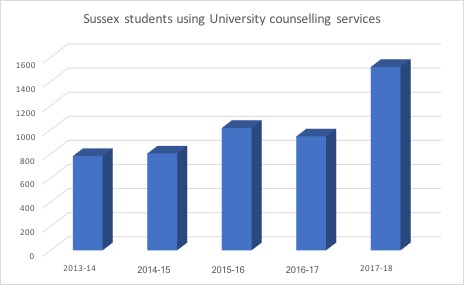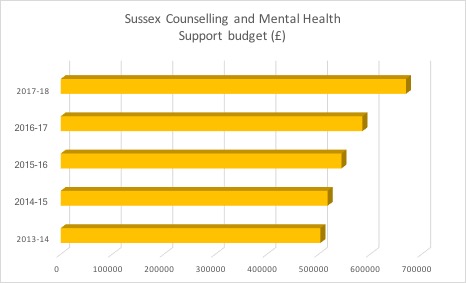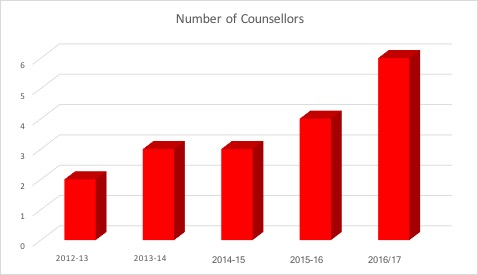Following the suicide of 22-year-old Sussex student Daniel Bowen, The Badger has consulted Sussex students, Sussex Students’ Union, and Sussex University about student mental health.
Sussex University was criticised by coroner Veronica Hamilton-Deeley for its handling of Mr Bowen’s case.
Ms Hamilton-Deeley highlighted that Daniel Bowen was put under pressure by academic staff despite his mental health issues.
She added that Mr Bowen was registered with student support but that this only occurred after he wrote ‘tragically sad’ poems in his Chemistry exams, days before his death.
The coroner has confirmed it has issued Sussex University with a regulation 28 report following Mr. Bowen’s death.
These reports are written when the coroner believes further action should be taken to prevent future deaths and is issued to the appropriate organisation, local authority, or government department.
Data from the Office for National Statistics (ONS) estimates that suicides amongst higher education students in England and Wales stood at 95 in the year ending July 2017.
This equates to a suicide rate of 4.7 deaths per 100,000 students. This is lower than rates within the general population, according to 2016 data.

This comes amid what has been hailed a national crisis in student mental health. ONS reported that suicide and ‘ injury or poisoning of undetermined intent’ was the leading cause of death for 20- 34-year-olds in 2017. Rates are higher amongst males.
Jayne Aldridge, Director for the Student Experience, said: “The mental health of our students is our absolute priority and we welcome any feedback that helps us improve what we do.
“The Division is currently conducting a review of all our processes relating to student wellbeing and mental.
“Once concluded, this will have both short-term and long-term measures to ensure that we can continue to support and respond effectively to students with acute mental health needs.
“We take seriously any complaints or comments from students – I urge you to contact me directly if this hasn’t been your experience so that I can investigate.”
Students can access support by contacting the Student Life Centre. The 24-hour security team in York House can also be contacted for urgent and out of hours support.
Waiting times for University counselling services are a concern for students facing mental ill health. Sussex’s waiting times decreased from 31.5 days in 2016-2017 to 27 days between September 2017 and June 2018.
May Gabriel, Sussex Students’ Union Welfare Officer, told The Badger “At the University Counselling service, the waiting times are a huge issue as is the limited amount of therapy that is offered but having worked with some of the people responsible for the services, I think people really do care.
“For example, the current head of Counselling managed to secure some sports therapy slots for students, as well as setting up the SHERPA pathway which I have heard really good feedback from.
“Things are happening, they’re slow but I have faith that they are moving in the right direction”.
Waiting times have fallen in spite of increasing numbers of Sussex students attending counselling. This stood at 782 in 2013-14 but had risen to 1521 in 2017-18 according to the University.
The University attributed this to significant growth in student numbers, an increased mental health support budget, and improved record-keeping from 2016.

Another concern highlighted by the students we talked to was having their mental health diagnosed simply as ‘stress’ or ‘worrying’. One second-year student, who wishes to remain anonymous, told us: “it has been a tackle to get people to take my anxiety seriously… I have found that individual tutors and lecturers mistake anxiety for ‘worrying’ and do not necessarily realise that it is a mental health condition.
“I think that staff should get formal training about dealing with students with mental health issues, as I have been distressed at times after communicating with staff over my time at University.
“I have spoken to the Student Life Centre in the past and found that my anxiety was brushed aside as I wasn’t registered as having an ongoing mental health issue, but simply wanted to discuss my problems.”
“The Student Support Unit are amazing at communicating with staff and making sure you get adjustments for assessments… This department, I feel, is the only one on campus that is consistently positive and helps on a practical level”, they added.
A third-year student from Global Studies told us that they find Sussex University absence emails distressing. They said: “Getting the attendance emails is so stressful especially since I already have stuff set in place to prevent this from happening (as the uni are supposedly already aware of my situation). It usually comes down to the tutors not reading the special circumstances attached to my study direct file!
“Everything is there for them clearly laid out, student support has done everything they can, as have the Global Studies office, it’s just the teachers’ laziness as it’s easier for them to just report absence rather than look into the actual cause of the absence. This then sets off the automated email system which sends out the semi-threatening emails – which… are less than helpful to any student who is already struggling to make it to classes!”
Both students suggested that the approach of academic staff, and not University mental health services, needed improvement.
Several students who have taken their own lives while at Sussex were studying science subjects. This includes Daniel Bowen, who was studying Chemistry at the time of his death and 19-year-old Rajiv Aryal, who was studying astrophysics at Sussex and died in 2018. The Badger has approached the University to see what is being done to ensure the wellbeing of students in Life Sciences and Brighton and Sussex Medical School; such students usually have busy timetables and regular assessments which could affect their mental wellbeing.

Sussex Students’ Union recently launched a mental health survey and identified mental health among the top priorities of candidates for the SU elections in March. The University and SU are also collaborating on mental health focus groups and all are welcome to sign up. May Gabriel, Welfare Officer, said: “We’re trying to get 1,000 students to fill it [the survey] out” and told us that the survey will close in mid-April, but that no date had been fixed yet.
When asked why the survey was being carried out at this time, Ms Gabriel told The Badger:
“Putting out a Union Mental Health Survey was one of my Annual Plan priorities at the beginning of the year as there hadn’t been one done for several years and I thought it was important to put out a survey to get a clear understanding of the mental health landscape at Sussex. In terms of the timing, originally we wanted to put the survey out earlier and publish the results in Wellbeing Week, however, due to the timing of the NSS we thought it would be better to launch the survey in Wellbeing Week so the two didn’t overlap too much.”
The Welfare Officer also told us that students had “really really mixed experiences” surrounding mental health support at Sussex. “Brighton, in general, has some of the worst referral rates in the UK, and I think that adds to the pressure on the University mental health services,” she added.
When asked about the SU’s current strategy on mental health, Ms Gabriel replied: “As you probably know the Union is currently creating a new strategy, and ‘Your Wellbeing’ is one of the main pillars…
“This would include things like Tea and Talk, which is a student-run peer support network – but also continuing to lobby the university to step up and make a change and improve the mental health provisions that are offered.
“Alongside this, so many activities within the Union can help have a positive impact on the Sussex Community – from the Buddy Scheme to sports and societies – they can all health have a positive impact on mental health.”
Other initiatives are also taking place at Sussex. Paige Lewis, who founded the SU Mental Health Project at Sussex told The Badger: “I struggled greatly in my first year of university and felt very alone. I organised a talk to meet like minded people and spread Awareness and it grew from there”.
The Good Night Owls are employed by the Students’ Union to ensure the safety of students when they go for a night out. The group recently hosted a SafeTALK suicide prevention and alertness training session which was delivered by Grassroots.
Good Night Owl Volunteer and Good Night Owl Administrator, India Whalley, told The Badger: “Opening ourselves up to conversations about mental health and the issues associated with mental health problems, including suicide, is something I strongly believe we should all be much more encouraged to do.
“The main motivation for booking the Grassroots SafeTALK Suicide and Awareness training was simply to provide a platform for us, as volunteers, to engage more in conversations about potentially sensitive topics, such as suicide, and be more confident in bridging the gap between students and the support available.
“As Good Night Owls, we are constantly exposed to potential disclosure so the confidence gained from the training in approaching these conversations in a more educated and understanding way means we will be better prepared to link students with the specialised support that might be able to make a difference. From our experience, it is not so much a lack of provision of support as a whole which prevents a lot of young people from seeking help but is often uncertainty around accessing this support or simply the huge demand for support directly through the University instead.”
Women’s Officer and Good Night Owl volunteer, Sarah Osborn added: “Student mental health can absorb so much time and energy of students. Recent polls on loneliness have shown that 17% of students feel lonely daily, and without this sense of community mental illness can thrive. We see this on nights out when students are separated from their friends, leading them to rely on night workers like GNO and club staff to keep them safe.
“There is so much variety in the minds of students that the blanket support of the Student Life Centre is both oversubscribed and unequipped to support the diversity of our university – but through no fault of their efforts.
“The care and passion that the SLC has for its attendees is vast, but the needs of the students is greater. With [the] wait for counselling, and scarcity of bookable appointments, it can feel as though the university is against you when you already have your own mind to battle with.
“But GNOs serves as a friendly face in the night at times of crisis and inconvenience so students can at least feel safe in Brighton”.
If you, or someone you know, is affected by these issues please get in contact with Student Support. For 24/7 or urgent support, contact York House Security. You can also ring Samaritans on 116 123 at any time. Please see this link for a full list of support contacts at Sussex.
Main image courtesy of Pixabay: Tumisu

